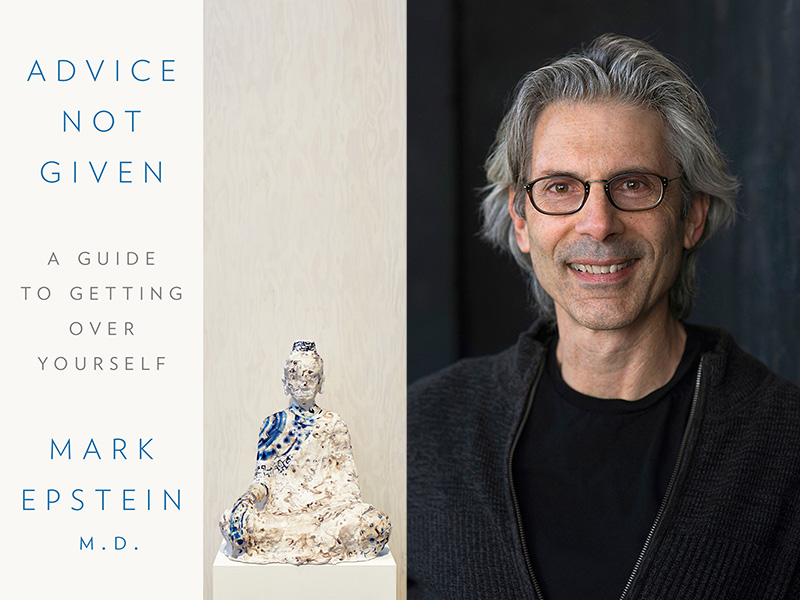(RNS) — Psychiatrist and Buddhist scholar Mark Epstein marries his religion and his therapeutic practice in a new book that may be particularly fitting for these fraught social and political times: It’s about the ego, which he calls the main ingredient of identity.
In the book, “Advice Not Given: A Guide to Getting Over Yourself,” Esptein writes about how Buddhism and psychiatry, which both deal with the ego, can help people find equanimity between their inner and outer lives. He elaborates on the therapeutic potential in Buddhist practices in facing the indignities, traumas and fears threaded through everyday life.
Psychiatry, he says, helps people “make sense of their internal conflicts and unconscious motivations, to relax against the ego’s perfectionism.” And Buddhist meditations teach people “to watch their own minds without necessarily believing everything they think.”
This interview has been edited for length and clarity.
[ad number=“1”]
Why focus on the ego now? Is this the most ego-driven public square ever?
Probably not although it certainly seems that way. It is one of those times when the underside of the ego — insecurity, self-judgment, and narcissism — is on full display. But ego is essential to us. If we didn’t have an ego, we’d be psychotic. The ego is the main ingredient of our identity — how we think about ourselves. It is our executive function. It’s about managing or controlling things, how we mediate between what is inside us and the demands of the outside world.
President Trump, reacting to critical comments on his state of mind in Michael Wolff’s new book, “Fire & Fury,” describes himself as a “stable genius.” What do you think of another book in which 27 mental health experts assessed him as a “dangerous case”?
I agree with one of my former professors, Allen Frances, who says it is risky to diagnose from afar. But I disagree with someone who said Trump has “a kind of emotional intelligence.” That is a misunderstanding of the term. “Emotional intelligence” is the ability to check your ego at the door so you can relate to the inner experience of another. It’s the opposite of narcissism where you are propping yourself up all the time. Watching the president is watching the insecure ego racing to destroy any kind of criticism and prop itself up.
[ad number=“2”]
Don’t we all do that, to a certain degree? Is meditation the escape route from those reactions?
“Getting over yourself” means not completely identifying with self-judgment. The ego judges others and judges one’s self. It doesn’t go away. But we cannot buy into it every time. We can have a sense of humor. We can take a backwards step. Meditation is a way to do that.
Why do you call Buddhism a religion, when some people call it a philosophy, and describe meditation as a “spiritual” act?
Buddhism has been called the most psychological of the world’s religions and the most spiritual of the world’s psychologies. “Spiritual” to me is anything that takes your own personality, out of your own ego, that puts you in touch with an element of mystery in the lives we lead.
[ad number=“3”]
Would this conflict with being Jewish or Christian? (Epstein describes himself as culturally Jewish.)
I don’t see conflict between Buddhism and the idea of letting go of yourself and letting God or Christ into your heart. The inner, subjective maneuver is very similar. Instead of identifying wholeheartedly with your own little ego, you are able to put it aside and make room for another energy, call it God or Christ, to take over. I know from my patients in 12-step programs how powerful that little maneuver can be. But it’s not a one-time action. It’s always up to us to work diligently, patiently, nonjudgmentally with ourselves over time.
After decades as a Buddhist, you describe yourself as cold, cranky and aloof at times and yet cheerful and hopeful as well. What do you have hopes for?
For Oprah after the Golden Globes, for the world, for the planet, for my family, for my own little thread of consciousness. I’m always looking for the balance between faith and despair. And I have faith in the psychological way of faith — that even our most destructive impulses don’t have to take us down and can be used in some kind of way productively. I’m basically an optimistic person even in the midst of so much fear.





